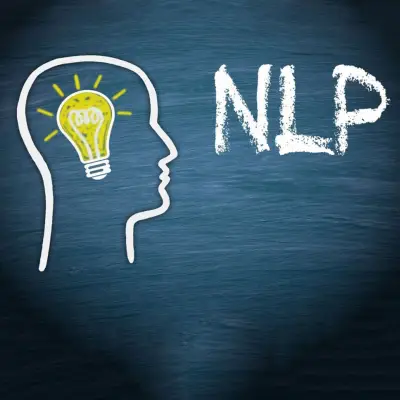Curious about how Neuro-Linguistic Programming (NLP) can enhance your personal, educational, and professional life? This blog uncovers the principles and techniques of NLP, revealing how it can transform perceptions, reshape behaviours, and unlock your true potential.
Jump to:
What is NLP?
In the early 1970s, a college student and a linguistic lecturer at the University of California created what is now known as Neuro-Linguistic Programming, or NLP. This concept explores the process of human thought and how our perception and actions, influenced by our senses (neuro), language (linguistic), and behaviour patterns (programming), lead to specific outcomes.
What are The Three Pillars of NLP?
NLP helps change thought and behaviour patterns to achieve specific goals. It focuses on three pillars:
- Neuro: This aspect focuses on how our senses shape our thoughts and, consequently, influence our emotions, behaviour, and physiology.
- Linguistics: refers to our communication methods – the words we choose and our expression. Our unique mental processing means no two people will narrate the same experience identically.
- Programming: In the context of NLP, programming relates to how our brains code experiences, shaping attitudes, habits, and behaviours.
What is an NLP Practitioner?
An NLP practitioner uses neuro-linguistic programming techniques to help people modify their behaviour by becoming aware of their unconscious patterns. For example, addressing deeply embedded fears or phobias at the unconscious level can lead to significant behavioural changes.

What Conditions Can NLP Treat?
When applied in coaching and therapeutic contexts, NLP can address issues like anxiety, depression, PTSD, ADHD, and addiction. Practitioners work with NLP representational systems, which involve understanding how people process information differently – visually, auditorily, and kinaesthetically – to tailor their approaches effectively.
What is an Example of an NLP Technique?
An example of a neuro-linguistic programming (NLP) technique is the "Reframing" method. Reframing is a process where you change how you perceive an event and, consequently, change the meaning. When applied, it can alter your emotional and behavioural responses to certain situations.
Here's a practical example:
Situation: You have a fear of public speaking due to an experience where you felt embarrassed during a presentation.
NLP Reframing Technique:
- Identify the Negative Frame: Recognise that your current perception of public speaking is framed negatively due to your past experience.
- Challenge the Frame: Question whether this experience truly defines your speaking ability in public. Is it fair or accurate to let one event colour all future experiences?
- Create a Positive Frame: Replace the negative frame with a positive one. For instance, you might reframe the situation by focusing on the opportunity public speaking presents for personal growth, the chance to share valuable information, or the ability to connect with an audience.
- Visualise the Positive Outcome: Imagine successfully giving a speech, feeling confident, and being well-received by the audience.
By changing how you perceive the event (from a fear-inducing experience to an opportunity for growth and connection), your emotional and behavioural response to public speaking can shift from avoidance and anxiety to openness and confidence.

Can NLP be Applied in Educational Settings?
NLP has many practical applications in education, offering tools for both teachers and students to improve the learning experience. It enhances teaching methods, caters to different learning styles, improves student motivation, and manages classroom dynamics.
NLP Learning Techniques for Students
NLP (Neuro-Linguistic Programming) offers several powerful learning techniques that can be particularly beneficial for students:
- Visualisation: This involves creating vivid mental images of what you're learning. For instance, if you're studying history, imagine yourself in the historical period you're studying. Visualisation helps in making abstract information more concrete and memorable.
- Anchoring: This technique involves associating a physical touch or gesture with a particular state of mind. For example, students might touch their thumb and forefinger together while feeling relaxed and focused. Repeating this gesture can evoke the same state during stressful situations like exams.
- Reframing Negative Thoughts: Students often face self-doubt and negative thoughts about their abilities. Reframing involves changing these negative thoughts to positive ones. For example, instead of thinking, "I'm bad at maths," reframe it to, "I'm improving at maths every day with practice."
- Chunking Information: This technique involves breaking large pieces of information into smaller, more manageable chunks. It makes it easier to process and remember large amounts of data, like study material.
- Mind Maps: Creating mind maps for topics can help organise and connect various pieces of information visually. This leads to better retention and understanding of the subject.
- Goal Setting and Pathways Thinking: This involves setting specific, achievable goals for study sessions and creating a clear plan of action to achieve them. It helps in maintaining focus and direction in studies.
- Rapport Building: Creating a positive, supportive learning environment. For students, this can mean developing good relationships with teachers and peers enhancing the learning experience.
- The Meta Model: Asking specific questions to clarify vague statements and better understand study material and assignments.
- Modelling Excellence: Observing and replicating the strategies, behaviours, and attitudes of peers or mentors who excel in a subject area you're trying to improve.
- The Swish Pattern: This NLP technique changes unhelpful behaviours or reactions. For instance, students who feel anxious before tests can use the Swish Pattern to replace anxiety with a more confident and calm state of mind.

NLP Frequently Asked Questions
What are the benefits of learning NLP?
Learning NLP offers numerous benefits, including improved communication skills, enhanced self-awareness, better emotional management, and the ability to change limiting beliefs and behaviours. It's particularly useful in personal development, education, and professional settings.
Can NLP techniques be self-taught?
Many NLP techniques can be learned independently through books, online courses, and practice. However, working with a qualified NLP practitioner or taking structured courses in NLP can provide a more comprehensive understanding and effective application of these techniques.
How is NLP used in everyday life?
In everyday life, NLP can improve interpersonal communication, set and achieve goals, overcome fears and phobias, and enhance decision-making skills. It's also useful in managing stress and fostering a positive mindset.
How long does it take to learn NLP?
The time it takes to learn NLP can vary depending on the individual and desired mastery level. Basic understanding can be achieved within a few weeks of intensive study, but becoming proficient, especially as a practitioner, may take several months to years of practice and learning.
Are there different levels of NLP training?
NLP training is often structured in levels, from introductory courses to practitioner, master practitioner, and trainer levels. Each level delves deeper into the techniques and applications of NLP.
Is NLP recognised in psychology and therapy?
NLP is recognised and used by many professionals in psychology and therapy. However, it is considered a complementary approach to a conventional psychological practice. It's often integrated with other therapeutic techniques for a more holistic mental health and well-being approach.
Is NLP the same as hypnosis?
NLP is not the same as hypnosis, though they share some similarities in terms of influencing the mind. NLP is a communication model focusing on understanding and using language to influence thought patterns and behaviours. Hypnotherapy, on the other hand, involves inducing a trance-like state to access the subconscious mind, aiming to change habits or behaviours more directly. While NLP can incorporate some elements of hypnotic language and techniques, it is broader in scope and application.
Recommended for you!
Best SellersCan NLP help with professional and career development?
NLP can be particularly effective in professional and career development, improving leadership skills, enhancing communication and negotiation abilities, and fostering better team dynamics.
How does NLP differ from traditional counselling or therapy?
NLP differs from traditional counselling or therapy in its approach and techniques. While traditional therapy often focuses on exploring and understanding past experiences, NLP is more action-oriented, focusing on the present and future and how to change thought patterns and behaviours for desired outcomes.
What is the success rate of NLP?
The success rate of NLP varies depending on the context and the individual. While many report significant positive changes, it's important to note that personal commitment and the practitioner's skill also play important roles in the effectiveness of NLP.
Transformative Courses in NLP with Centre of Excellence
If you're intrigued by the transformative potential of Neuro-Linguistic Programming, our NLP Foundation Skills Diploma Course guides you through all aspects of NLP, while our practitioner and master practitioner courses offer a more advanced level of study.
What You'll Gain:
- In-Depth Knowledge: Dive deep into the fundamentals of NLP, understanding its principles, techniques, and real-world applications.
- Practical Skills for Life: Acquire valuable skills like effective communication, self-awareness, and behavioural change techniques that can be applied in various aspects of your life.
- Empowerment for Personal and Professional Growth: Equip yourself with tools for self-improvement, enhance your interactions, and pave the way for personal and professional success.
Special Offer:
We're excited to present these enriching courses at an exclusive price of £29, saving you over £100!













